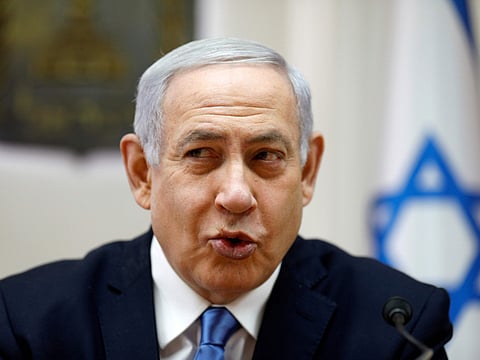Netanyahu takes re-election bid to dangerous levels
Israeli decision to shut down an entrance to Al Aqsa Mosque Compound a precalculated move

Despite a decision by Israel’s attorney general to indict him for corruption while in office, Israeli Prime Minister, Benjamin Netanyahu, remains defiant. He told Israelis on a televised address on February 28, that he intends to remain a prime minister “for many more years.”
But the truth is that Netanyahu, who has served as prime minister since 2009 is finally an embattled leader. He has used every political strategy to remain in office, including the waging of wars and appealing to the most extreme elements in his own society. And it worked well for him, until very recently.
Indeed, the political union between two Israeli centrist leaders, Benny Gantz and Yair Lapid, which was declared on February 21, has certainly upped the ante for Netanyahu who has assumed that his election victory is a foretold conclusion.
Gantz and Lapid merged their two parties into one election list called Kahol Lavan (‘Blue and White’), the single most serious electoral challenge for Netanyahu in years.
Befuddled with the unexpected move of his opponents (notorious for their own disunity), Netanyahu resorted to an old strategy — getting even closer to the Right.
Indeed, Netanyahu’s decision to strike an alliance with Otzma Yehudit (Jewish Power), the rebranded party of the extremist late Meir Kahane, further demonstrates how the current surge of violence around the holy Palestinian sites is a pre-calculated political move by the prime minister and his government.
The fact that Netanyahu would bring into his future coalition groups that are the ideological mutation of the Jewish Defence League — which is classified as ‘terrorist organisation’ by the US Federal Bureau of Investigation (FBI) — speaks volumes about the changing relationship between the US and Israel. Thanks to Washington’s blind support of Israel, Netanyahu feels politically triumphant and invincible, even above US laws.
Considering the growing nature of Netanyahu’s challenges — be it legal or political — he understands that more needs to be done to secure his position at the helm of Israeli politics.
However, a war on Gaza is a non-option for now, bearing in mind the botched raid on the besieged strip on November 11, and the unmitigated political fallout of that failed military operation.
This political reality leaves Netanyahu with the option of garnering support among his far-right and religious constituency by appealing to their extremist views concerning Palestinian religious sites in Jerusalem, Hebron and elsewhere.
On February 18, members of extremist Jewish groups raided the Al Aqsa Mosque compound in Occupied Al Quds (Jerusalem). They clashed with Palestinian worshippers, as colonists attempted to shut down the gate of Al Aqsa itself.
The clashes involved the Israeli army as well as police who opened fire and brutally assaulted Palestinians, leading to scores of injuries.
On February 19, the Israeli army carried out the unusual step of shutting down Al Rahma Gate, which leads to a section of the Al Aqsa compound that has, itself, been shut down by the Israeli army since 2003.
The provocative decision to seal the gate was clearly premeditated with the imprints of Netanyahu’s personal involvement.
The political ploy worked in that it mobilised the Israeli right into action. On February 26, Israel’s far-right agriculture minister Uri Ariel once more ‘toured’ Al Aqsa accompanied by extremist Jewish colonists and troops. A day later, ultra-Orthodox Israeli Knesset member Yehuda Glick paid Al Aqsa another provocative ‘visit’ through the Moroccan Gate, instigating clashes with Palestinian worshippers.
The campaign targeting Al Aqsa by far-right politicians is expected to grow as the April 9 early-elections date draws closer.
Similar political overtures to the far-right religious constituency were made earlier in the Palestinian city of Al Khalil (Hebron). On January 28, Netanyahu ordered the unarmed UN international observers to leave the occupied Palestinian city where 700 armed Jewish colonists have been a constant source of violence. The Jewish colonists of Qiryat Arba’a live under the protection of a massive Israeli army contingent. Both groups have worked together to terrorise the Palestinian inhabitants of the city for many years.
A joint statement issued by several humanitarian organisations, including Oxfam, the Norwegian Refugee Council (NRC) and Save the Children warned of the terrible fate awaiting the Palestinian community as a result of Netanyahu’s decision in Al Khalil.
“Hundreds of civilians, including children, will see their safety put at risk by the withdrawal of international observers,” the statement read.
By unleashing the wrath of Jewish colonists in Al Khalil, Netanyahu appeared intent on communicating to his supporters that he remains committed to their colony project, an unworthy cause that violates international law and comes at the price of protracted human suffering.
The Israeli decision to shut down Al Rahma Gate on February 19 falls in the same category of precalculated moves aimed at uniting the entirety of the Israeli far-right behind Netanyahu’s leadership in the coming elections.
To realise his dream of being Israel’s longest-serving prime minister, Netanyahu should be wary of the bloody consequences that his reckless action is sure to yield.
While the blood of Palestinians is irrelevant in Netanyahu’s quest for political dominance, the international community should take immediate measures to prevent what could become an Israeli-induced bloodbath in the coming weeks.
Ramzy Baroud is a journalist, author and editor of Palestine Chronicle. His latest book is The Last Earth: A Palestinian Story (Pluto Press, 2018). He earned a Ph.D. in Palestine Studies from the University of Exeter, and is a former Non-Resident Scholar at Orfalea Centre for Global and International Studies, UCSB.
Sign up for the Daily Briefing
Get the latest news and updates straight to your inbox


